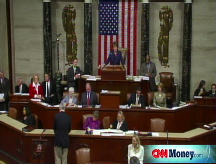Bailout: Will it work?
Experts differ on whether the $700 billion bailout plan will prompt banks to lend and help the economy. But even if it does, it will take time.
NEW YORK (CNNMoney.com) -- The $700 billion bailout plan signed into law Friday may get banks to start lending to each other again. But it remains to be seen how long that will take to jumpstart an ailing economy.
The goal is to unfreeze the credit markets. Financial institutions have become paralyzed with fear and though they have plenty of cash on hand, they've been hoarding it. Without this intra-bank lending, businesses are having trouble getting the financing they need even for daily operations, much less loans for longer-term projects.
"Hopefully, this will lend a calming effect to the markets," said Joe Belew, president of the Consumer Bankers Association. "We need to take a deep breath, relax and start doing business again."
Don't expect lending to ramp up overnight, however. It may take weeks for confidence to return, experts said. Or even longer.
The centerpiece of the bill allows the government to eventually buy up to $700 billion in assets tied to shaky mortgages. Getting the bad paper off banks' balance sheets hopefully will give institutions more confidence to start lending again. (Bailout 101: What the new law says)
Treasury Secretary Henry Paulson has up to 45 days to devise a plan to purchase the assets.
But one big question is what the Treasury Department will pay for those assets. Too low a price - which is good for taxpayers - and banks may find they still need to take steps to shore up their balance sheets. Some may have to raise additional capital, which has been scarce in this tumultuous market. Investors may remain on the sidelines for a while until things shake out, experts said.
The plan's passage did little to allay fears in the stock market, which sold off once the House approved the bill. Investors, who remain skittish that the bailout plan will achieve its goals, sent the Dow Jones industrial average down 1.5%.
"Thaws take time," said Diane Casey-Landry, chief operating office of the American Bankers Association, noting that the bailout plan won't instantly eliminate all concerns. "We'll be in the Ronald Reagan mode of 'Trust but verify'."
Even President Bush told Americans to have patience. "Americans should also expect that it will take some time for this legislation to have its full impact on the economy," he said. "With a smoother flow of credit, more businesses will be able to stock their shelves and meet their payrolls. More families will be able to get loans for cars and homes and college education. More state and local governments will be able to fund basic services."
Many economists, however, say the president and other supporters of the bailout were painting too rosy a picture.
Until the tidal wave of foreclosures ends and home values stop their stomach-churning drops, banks will remain reluctant to lend and the economy won't improve, experts said.
"This bill doesn't contain any element of stability for the housing market or the real economy," said Christian Menegatti, lead analyst for economic research firm RGE Monitor. "The problems are going to come back and the lack of confidence will come back."
In fact, nearly one in three financial services executives said they expect credit standards to continue to tighten even if the bailout plan is approved, according to a Deloitte poll taken Thursday. So it will still be tough to get a mortgage or small business loan.
"We're back to more normal underwriting standards," Casey-Landry said. "People will need to have good credit to get a loan."
As long as the constant drumbeat of bad economic reports continues, consumers and businesses may not be so eager to borrow money anyway even if banks start extending more credit. Friday's dismal jobs report, showing that 159,000 people lost their livelihoods, did little to inspire people to spend.
"You tell me I can have the credit, but I don't want it," said Amiyatosh Purnanandam, assistant professor of finance at the University of Michigan. "If people are not going to buy cars whether they can get credit or not, it's not going to help the economy."
This becomes a vicious cycle. If consumers don't spend, the economy fails to improve. The jitters may return to the financial markets, prompting another government intervention.
That's why many fear the $700 billion rescue may not be the last step.
"This is a tremendously expensive stopgap measure," said Adam Levitin, associate professor of law at Georgetown University. ![]()


